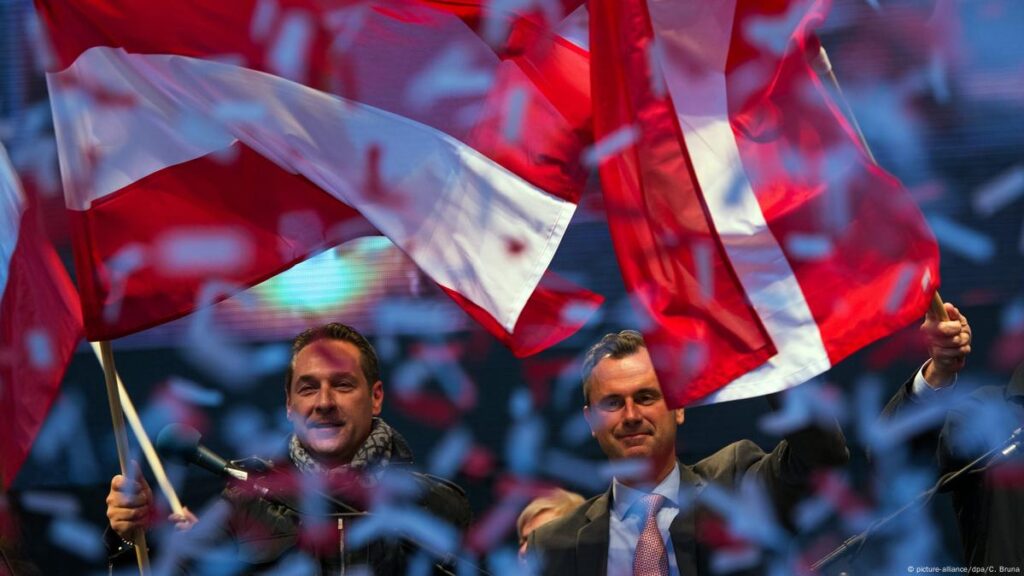Austria’s far-right Freedom Party (FPO) celebrated a landmark victory in the country’s parliamentary elections on Sunday, securing 29% of the vote—the party’s best result ever. However, despite this triumph, the FPO, led by the controversial Herbert Kickl, faces an uphill battle in forming a governing coalition, as leaders of other political parties in Austria immediately rejected the possibility of aligning with the far-right party.
Kickl’s Freedom Party, which is Eurosceptic and has expressed a friendly stance toward Russia, finished around 2.5 percentage points ahead of Chancellor Karl Nehammer’s conservative People’s Party (OVP). While the FPO’s victory is a significant milestone for far-right parties in Europe, the party must now navigate a complex political landscape to turn its electoral success into actual governing power. “Tomorrow there will be a blue Monday, and then we will set about turning that 29% into a political reality in this country,” Kickl told supporters after the results came in, referencing the FPO’s signature blue color.
Despite this optimism, Kickl encountered an immediate “reality check” when leaders of other parliamentary parties dismissed the idea of forming a coalition with the FPO. Without a coalition partner, the FPO’s win could become largely symbolic, limiting its ability to effect change. Kickl, known for his provocative style and alliance with Hungarian Prime Minister Viktor Orbán, offered to negotiate with any party, but his overtures have so far been met with skepticism.
Austria’s President, Alexander Van der Bellen, a former Greens leader who oversees the formation of governments, urged all political parties to engage in talks but cautioned that the process could be lengthy. If Kickl is unable to form a coalition, it could pave the way for a possible partnership between the OVP and the center-left Social Democrats, two parties that have dominated Austria’s postwar political history.
Victory for Europe’s Hard Right
Kickl’s win has been cheered by far-right parties across Europe, where nationalist and hard-right movements have gained momentum in countries like France, Germany, and the Netherlands. The success of these parties has raised concerns about divisions within the European Union, especially over critical policy areas such as support for Ukraine in its conflict with Russia.
However, far-right electoral victories do not always translate into governing power. In France, Marine Le Pen’s National Rally party won the first round of elections earlier this year, only to lose out when more moderate parties banded together in the second round. Similarly, in the Netherlands, nationalist leader Geert Wilders saw his ambitions to become prime minister dashed when no other party would support him in forming a government.
In Austria, Kickl’s leadership presents both an opportunity and a challenge for the Freedom Party. While the FPO has made gains with promises to restrict immigration and address inflation, Kickl’s polarizing figure may hinder his ability to secure the alliances needed for power. A recent survey by pollster Foresight indicated that only 2% of FPO voters were motivated by Kickl himself, the lowest figure for any party leader in the election.
“Orbanisation” and Controversy
Herbert Kickl, a former interior minister, has embraced several controversial positions, including promoting conspiracy theories about COVID-19 and pushing for the use of ivermectin, a de-worming drug falsely touted as a treatment for the virus. He has also called for ending sanctions against Russia, arguing that they harm Austria more than Moscow.
Kickl’s rhetoric and policies have drawn comparisons to Hungarian Prime Minister Viktor Orbán, with some critics warning that Austria could be headed toward “Orbanisation”—a reference to Hungary’s authoritarian political direction under Orbán. Irene Rubik, a 69-year-old retired civil servant and Greens voter, voiced her concerns about the future of Austrian democracy following the FPO’s victory. “The future of Austria as a democracy is now at stake,” Rubik said.
Founded in the 1950s under the leadership of a former Nazi lawmaker, the Freedom Party has worked in recent decades to moderate its image and expand its voter base. Despite its past, the party’s focus on curbing illegal immigration and tackling economic issues like inflation has resonated with many Austrians.
Limited Options for Coalition
The FPO’s victory places Kickl in a challenging position, as he seeks to convert electoral success into governing authority. The OVP is the only party that has signaled any openness to forming a coalition with the Freedom Party. However, Chancellor Nehammer has ruled out joining forces with Kickl, reiterating this stance after the election results were announced. Nehammer’s refusal to work with Kickl raises the possibility that Austria could see a coalition government between the OVP and the center-left Social Democrats, sidelining the Freedom Party despite its strong showing.
Political analysts warn that portraying Kickl as a menace and excluding him from potential coalitions may only strengthen his image as an anti-establishment outsider, appealing to a segment of voters who feel alienated by traditional political structures. “Herbert Kickl sees this as confirmation of his anti-system narrative,” said political analyst Thomas Hofer.
In the coming days, Kickl will face the difficult task of navigating Austria’s complex political landscape and convincing other parties to join him in forming a government. Whether his Freedom Party can capitalize on its historic victory remains to be seen.



